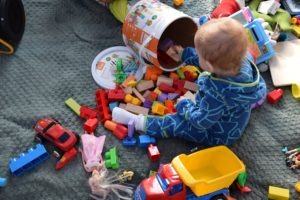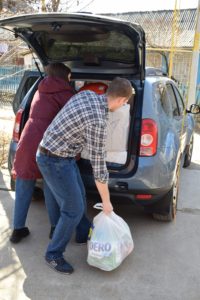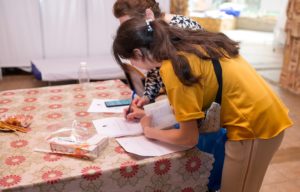 Keystone Moldova has been supporting refugees from Ukraine since the war started in late February.
Keystone Moldova has been supporting refugees from Ukraine since the war started in late February.
From February through June:
- 4,500 people, mostly mothers and children, used the tent at the Palanca border crossing
- 159 calls came into the Hotline Support Service
- 454 cases of direct support and medical assistance were provided by the Mobile Team
The tent at the border in Palanca is operated by Keystone Moldova in partnership with IsraAid. It’s a place where children and mothers can rest, play, and access information and supplies.
The 24/7 Hotline Support Service provides information and psychological and legal services, as well as referrals to other services. The number of calls continues to grow each month.
 As the name suggests, the Mobile Team travels throughout Moldova providing direct support and medical assistance, including medication, medical exams, assistive devices, medical equipment, nutrition and hygiene packages, toys and educational material for children, and adapted transportation.
As the name suggests, the Mobile Team travels throughout Moldova providing direct support and medical assistance, including medication, medical exams, assistive devices, medical equipment, nutrition and hygiene packages, toys and educational material for children, and adapted transportation.
But those are just numbers. Keystone Moldova’s work to support refugees from Ukraine is about people—people supporting other people to make sure everyone is safe, included, and receiving what they need.
Children play and stretch their imagination in the tent at Palanca, guided by volunteers and staff. Children build towers out of blocks, paint colorful pictures, and mold shapes with modeling clay. The tent and the volunteers and staff give them an opportunity to push reality aside and just be kids for a few hours. While their daughters and sons play, mothers have a moment to sip a cup of tea as they figure out the logistics of their next steps.
One mother used the Hotline Support Service to access essential medications for her two sons. “My sons have serious health issues and need to take their medication every day,” she said. “At the moment, we do not have the financial resources to buy the medicine they need. Our house in Ukraine was bombed. My husband died from his injuries. I decided to take my children and come to Moldova. We have met good people here who have offered us accommodations and food.”
 Keystone Moldova’s Mobile Team contacted the family’s medical doctor from the community they live in. Together with the doctor, they determined each boy’s medical needs and Keystone Moldova provided support to purchase the necessary medications.
Keystone Moldova’s Mobile Team contacted the family’s medical doctor from the community they live in. Together with the doctor, they determined each boy’s medical needs and Keystone Moldova provided support to purchase the necessary medications.
O and N, a couple from Ukraine, came to Moldova at the beginning of the war with O’s parents. N is a lawyer and O is a painter. Both have disabilities, and O requires a special diet of gluten-free food. At the moment, they are living in a beautiful village on the bank of the Nistru River, and while their surroundings are a source of inspiration for O’s paintings, it is very difficult and expensive to find gluten-free food nearby. She contacted Keystone Moldova, and we were able to provide her and her family with the necessary food and medicines.
Keystone Moldova is working to make sure that people like O and N and this mother and her sons are included in relief efforts. We are also working to ensure the resulting infrastructure changes are inclusive as the Republic of Moldova adjusts to accommodate everyone from Ukraine who is staying for the short- and long-term in the Moldova. With 20 years of expertise supporting people with disability and inclusion and backed by Keystone Human Services’ 50 years of experience in the United States, Keystone Moldova is leading the national response to support refugees with disabilities.
Keystone Moldova is leading the United Nations High Commissioner for Refugee’s Task Force on Disability, which is working to ensure people with disability are included in emergency response plans, coordinate activities and funds to quickly respond to urgent needs of refugees with disabilities, provide an efficient reference mechanism for available services and resources, and ensure the voices of people with disabilities are heard.
Active members of the task force have jointly provided support for over 1,400 refugees with disabilities. The most common supports include housing, nutrition and hygiene packages, health care, rehabilitation, information, psychological support, accessible transportation, legal assistance, and sign interpretation services. However, there is very little structured data about refugees with disabilities entering the country, and Keystone Moldova has been proactively working to map people’s needs.
An added challenge is the accessibility of refugee facilities. Most places are barely accessible for people with disabilities because of poor infrastructure, and inaccessible bathrooms and living spaces. The biggest needs in addition to accessible shelter continue to be specific nutrition, such as sugar-free or gluten-free; medication and diagnostic services; assistive equipment; and support services. Keystone Moldova is working to address people’s basic needs through currently available resources while continuing to consider the needs of Moldovans with disabilities.
Flexible funding is key during situations like this. Needs are constantly changing as people continue to flee Ukraine and others settle in Moldova more permanently. Your donation makes a difference. One hundred percent of funds support Keystone Moldova and our efforts to support the people of Ukraine. Donate today and make an impact.


 Keystone Moldova has been supporting refugees from Ukraine since the war started in late February.
Keystone Moldova has been supporting refugees from Ukraine since the war started in late February. As the name suggests, the Mobile Team travels throughout Moldova providing direct support and medical assistance, including medication, medical exams, assistive devices, medical equipment, nutrition and hygiene packages, toys and educational material for children, and adapted transportation.
As the name suggests, the Mobile Team travels throughout Moldova providing direct support and medical assistance, including medication, medical exams, assistive devices, medical equipment, nutrition and hygiene packages, toys and educational material for children, and adapted transportation. Keystone Moldova’s Mobile Team contacted the family’s medical doctor from the community they live in. Together with the doctor, they determined each boy’s medical needs and Keystone Moldova provided support to purchase the necessary medications.
Keystone Moldova’s Mobile Team contacted the family’s medical doctor from the community they live in. Together with the doctor, they determined each boy’s medical needs and Keystone Moldova provided support to purchase the necessary medications.